Understanding the Burning Plastic Smell Emergency
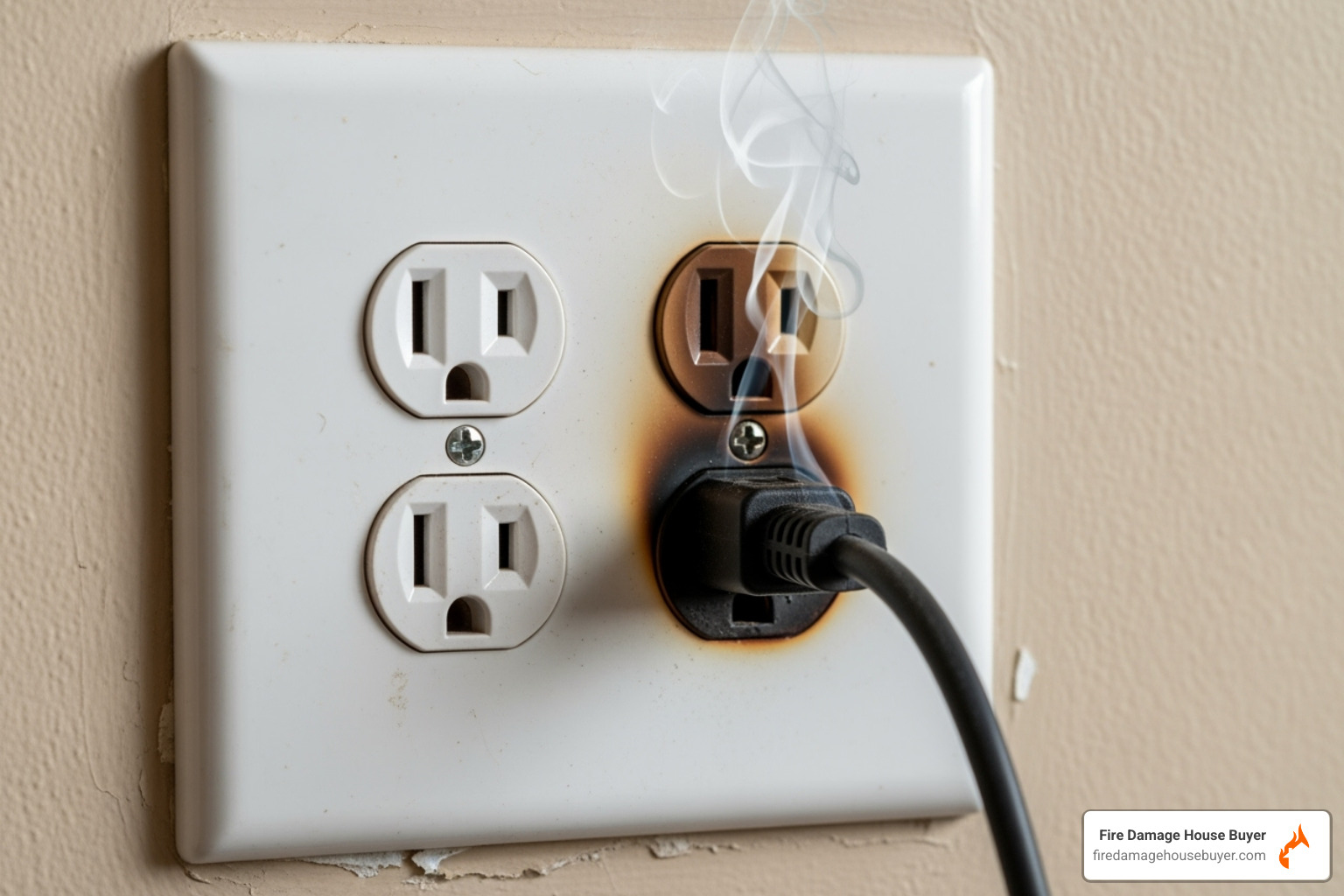
The question why does my house smell like burning plastic demands immediate action. This distinct, acrid odor signals a serious safety hazard that could escalate into a house fire within minutes.
Common causes of burning plastic smell:
- Electrical wiring issues – Overheating wires with melting insulation
- HVAC system malfunctions – Overheated blower motors or plastic components
- Appliance failures – Overheating kitchen appliances, space heaters, or dryers
- Overloaded electrical outlets – Melting plastic components from too many devices
This smell occurs when plastic overheats, releasing toxic fumes like carbon monoxide and dioxins. According to the National Fire Protection Association, since electrical faults and heating equipment cause about 13% of residential fires, this smell is a critical warning sign.
Detecting this odor can be alarming, as it often signals potential property damage. Fire restoration can cost $15,000 to $50,000 if caught early, but extensive damage can exceed $100,000 in repairs.
I’m Daniel Cabrera, and over my 15 years buying and selling fire-damaged properties, I’ve helped countless homeowners who first noticed why does my house smell like burning plastic before finding significant electrical or fire damage. Having personally bought and sold over 275 distressed houses, I understand the overwhelming challenges homeowners face when dealing with potential fire hazards and the costly restoration process that follows.
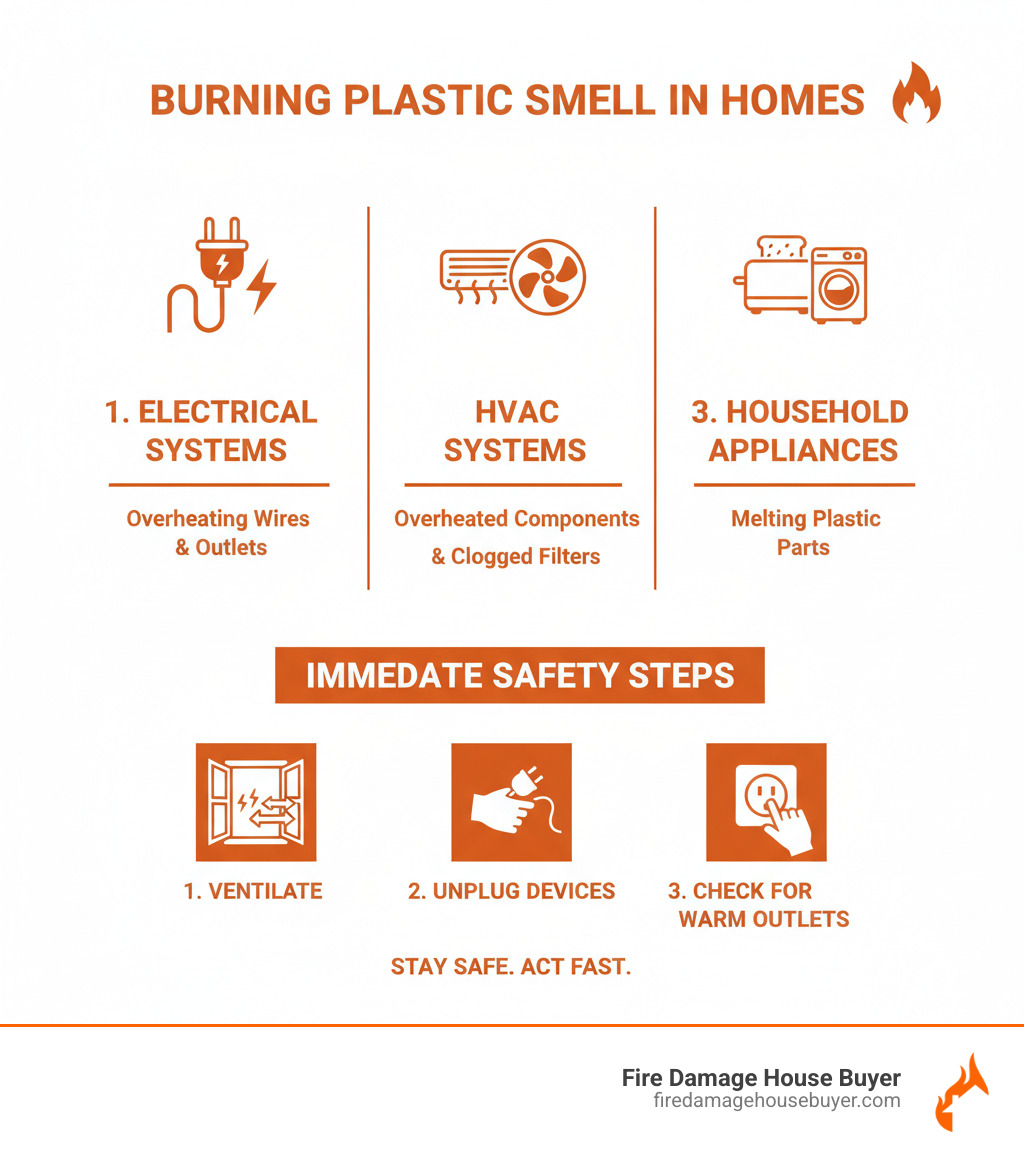
First Steps and Serious Health Risks
A burning plastic smell is a serious alarm that can’t be ignored. If you’re asking, “why does my house smell like burning plastic,” your immediate actions are crucial for your property’s safety and your family’s health. Burning plastic releases a cocktail of toxic chemicals into the air. Understanding these health risks underlines the urgency of the situation.
The moment you notice the odor, prioritize safety with these steps:
- First, ventilate your home immediately. Open all windows and doors to get fresh air flowing and turn on exhaust fans.
- Next, if you suspect an electrical problem, turn off the main circuit breaker for your house or the specific circuits in the affected area. This can prevent an electrical fire.
- Quickly unplug any appliances near the smell or that you suspect are overheating to stop the burning process.
- Finally, if the smell is strong, persists, or you can’t find the source safely, prioritize evacuation. Get everyone out and call 911 or your local fire department from a safe distance. Never go back inside if you suspect an active fire.
Taking these steps quickly can eliminate the source and protect everyone from harmful fumes. For a deeper dive into what you might be inhaling, refer to Plastic Fume Monitoring and Plastic Fume Exposure.
The Dangers of Inhaling Burnt Plastic Fumes
The fumes from burning plastic are hazardous, leading to immediate and long-term health issues. As certified master inspector Hubert Miles notes, “When plastic burns, it releases toxic fumes, including carbon monoxide, dioxins and volatile organic compounds (VOCs).”
These toxic substances can cause immediate symptoms like:
- Headaches
- Dizziness or lightheadedness
- Nausea
- Respiratory irritation (coughing, shortness of breath, burning sensation)
High exposure is dangerous due to the risk of carbon monoxide poisoning. This gas is odorless and colorless, blocking oxygen to your vital organs. This is why working smoke and carbon monoxide detectors are vital. The fire causing the plastic smell can also produce this deadly gas.
Prolonged exposure to these fumes can have serious long-term consequences, as many of the chemicals are known carcinogens. Addressing the source and ventilating your home is critical. Certified fire damage restorer Diana Rodriguez-Zaba adds, “When plastic burns, it tends to churn out heavy smoke that carries a sticky residue,” which complicates cleanup by spreading harmful substances throughout your home. Electrical fires often start with subtle cues like a burning plastic smell, one of the most critical warnings you can get.
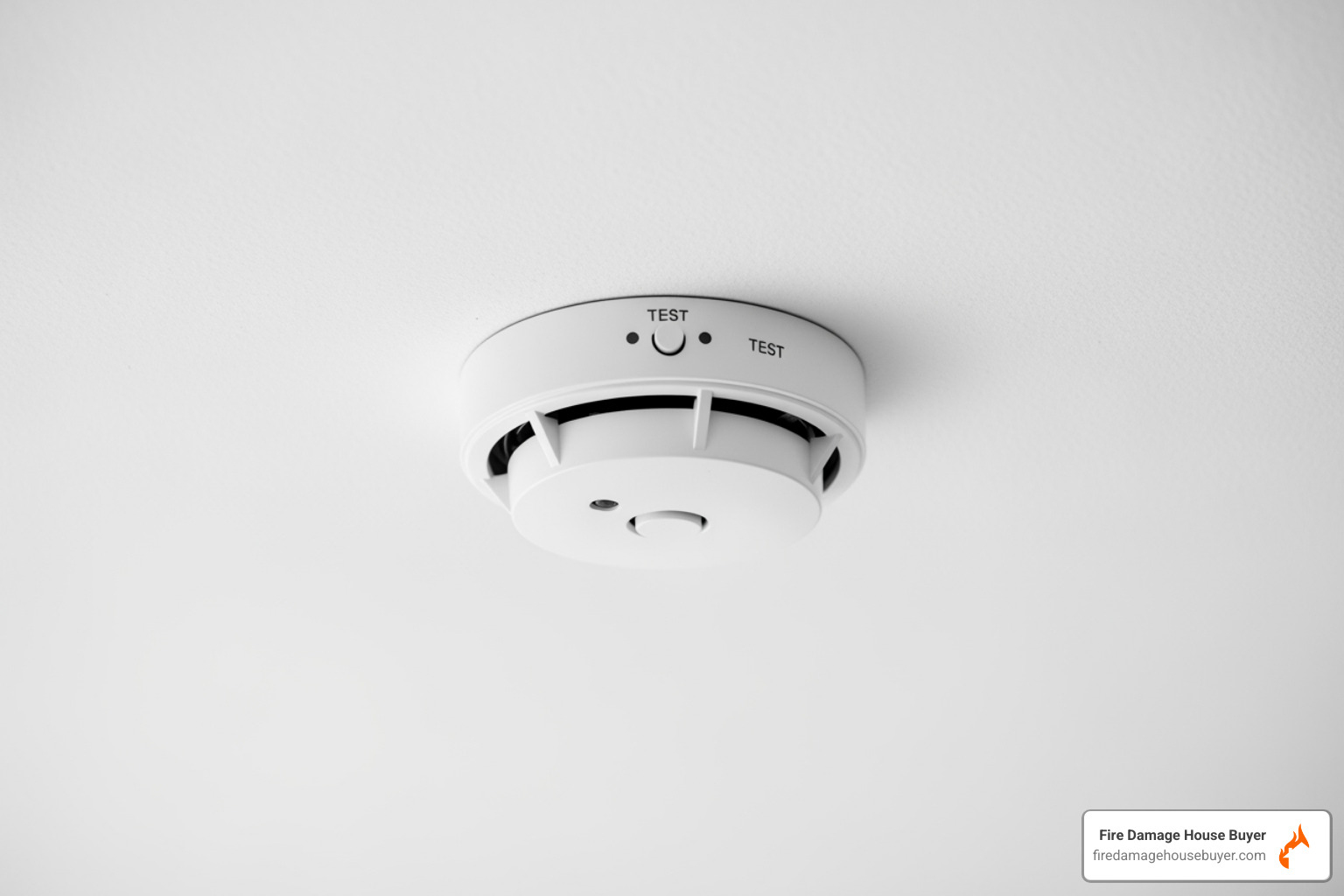
Why Does My House Smell Like Burning Plastic? The Most Common Culprits
Identifying the source of the burning plastic smell is key to resolving the problem safely. The odor almost always points to one of three areas: your electrical system, your HVAC unit, or an overheating appliance. Pinpointing the culprit quickly helps ensure your home’s safety and prevent fire damage. For more information on handling a fire incident, explore our Fire Damage Resources page.
Faulty Electrical Wiring and Outlets
This is the most dangerous cause. When electrical wires overheat, their plastic insulation melts and burns, creating the acrid odor. This is a direct warning sign of a potential electrical fire, a common cause of house fires.
Look for these signs of an electrical fault:
- Overloaded Circuits: Too many devices on one circuit can heat wires, melting their plastic insulation.
- Faulty Outlets: Worn out, damaged, or improperly installed outlets can lead to loose connections, sparking, and overheating.
- Warm or Discolored Outlets: An outlet that is warm or has scorch marks is a critical warning sign.
- Frayed Wires: Old or damaged wiring with cracked insulation can cause short circuits and overheating.
- Buzzing Sounds: Buzzing or crackling from an outlet or switch often indicates loose wiring or arcing.
- Flickering Lights: Frequent flickering or dimming can be a sign of stressed or faulty wiring.
If you suspect an electrical issue, act swiftly. Gently feel outlets and light fixtures for warmth. If an outlet is warm or discolored, turn off its circuit at the electrical panel immediately and call a licensed electrician. Ignoring these signs can lead to serious property damage or injury.
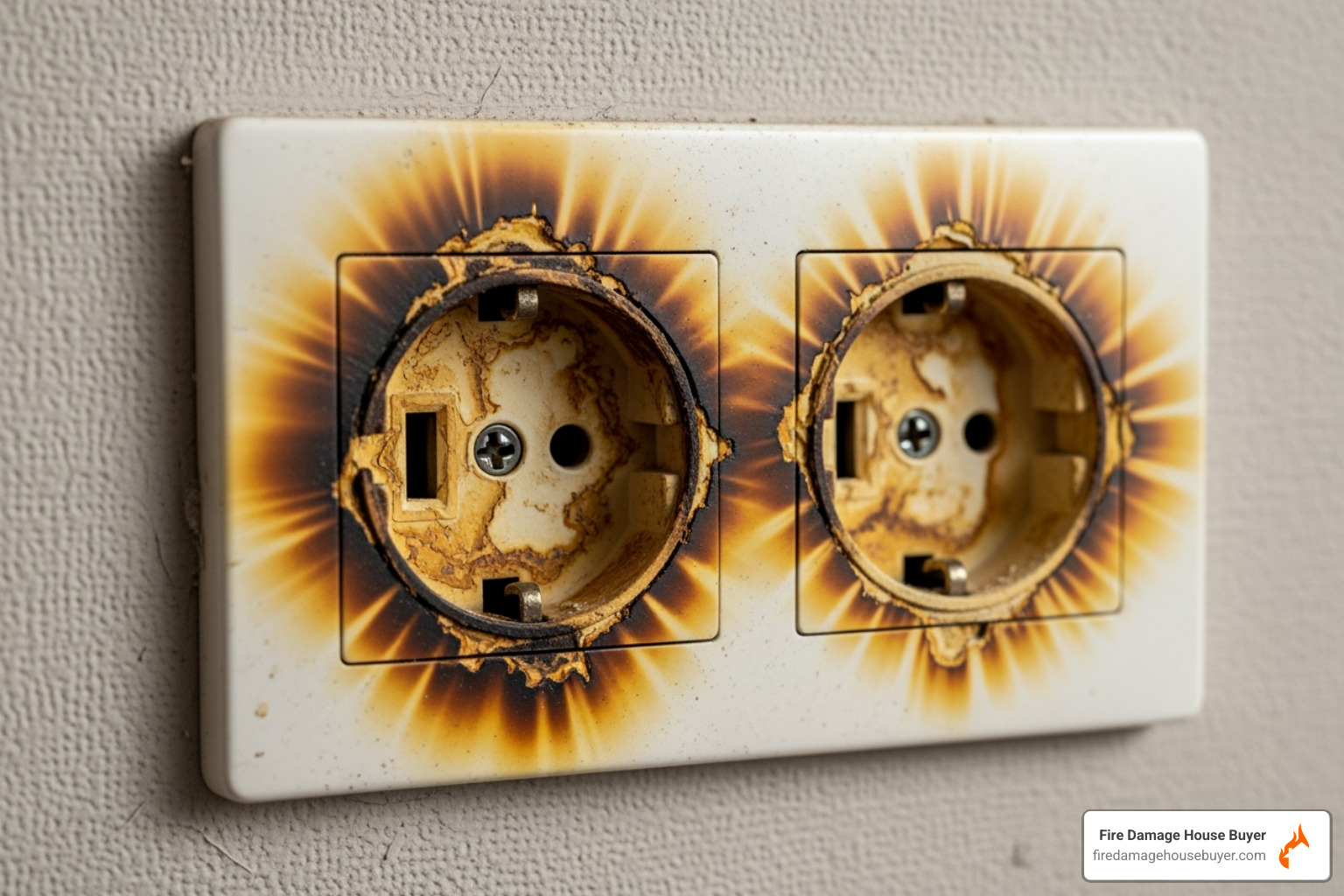
Overheating HVAC Systems
Your HVAC system has many plastic and electrical parts that can overheat and burn when strained, causing a burning plastic smell. This is common when first using your heat after a long period of inactivity.
Here’s how your HVAC system might be the source:
- Clogged Air Filters: A dirty filter restricts airflow, forcing the system to work harder and overheat components.
- Overheating Blower Motor: Lack of lubrication, dust buildup, or restricted airflow can cause the motor to overheat, melting its plastic casing or wiring.
- Dust Buildup: Dust on heating components can burn off when you first turn on the heat. If this smell persists or smells like plastic, it indicates a more serious issue.
- Other Electrical Problems: Wires and other electrical components within the HVAC unit can fail and overheat.
If you smell burning plastic from your HVAC system, shut it off at the thermostat and the circuit breaker. If the smell persists for more than an hour, call a certified HVAC technician. Do not attempt complex HVAC repairs yourself; professional diagnosis is crucial for safety. You can learn more about the heat involved in these situations by visiting How Hot Does a House Fire Get.
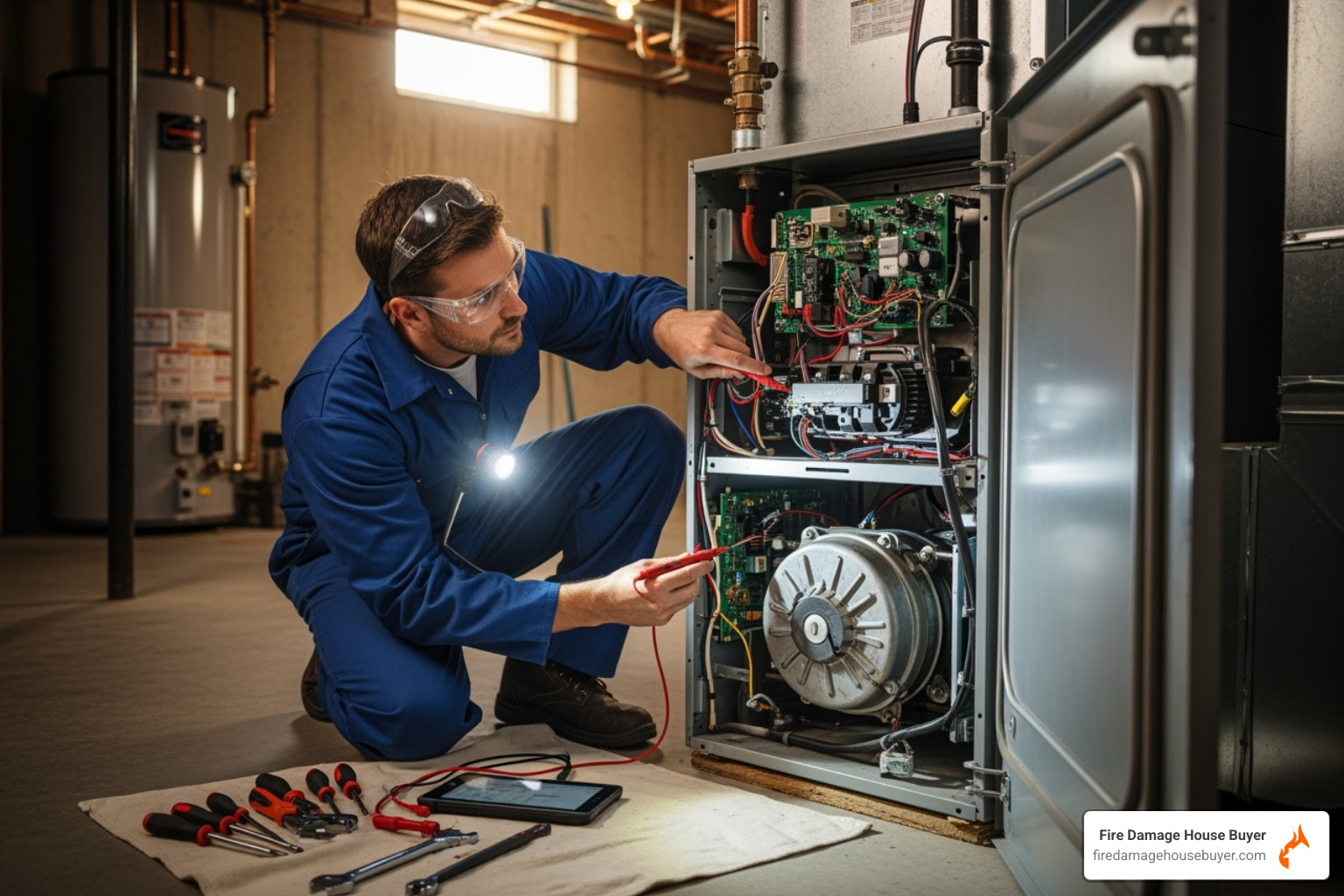
Malfunctioning Household Appliances
Many daily appliances contain plastic parts that can melt when they overheat due to defects, poor maintenance, or wear and tear. This is a common reason why does my house smell like burning plastic and a clear signal that an appliance needs immediate attention.
Common appliance culprits include:
- Kitchen Appliances: A plastic utensil falling onto a heating element in a dishwasher or oven is a common cause. Toasters, microwaves, and coffee makers can also malfunction and overheat.
- Space Heaters: These devices generate intense heat and can easily melt their plastic parts if they malfunction or are placed too close to flammable items.
- Dryers: Lint buildup in the trap or vent hose is a major fire hazard that can cause the dryer to overheat, melting internal plastic components.
- Other Small Appliances: Hair dryers, vacuum cleaners, and even phone chargers can overheat from internal faults or blockages, causing plastic to melt.
If an appliance smells like burning plastic, unplug it immediately. Inspect the appliance and outlet for damage like melted plastic or scorch marks. If the appliance is the source, have it inspected or replace it, especially if it’s old. Never continue using an appliance that has shown signs of overheating.
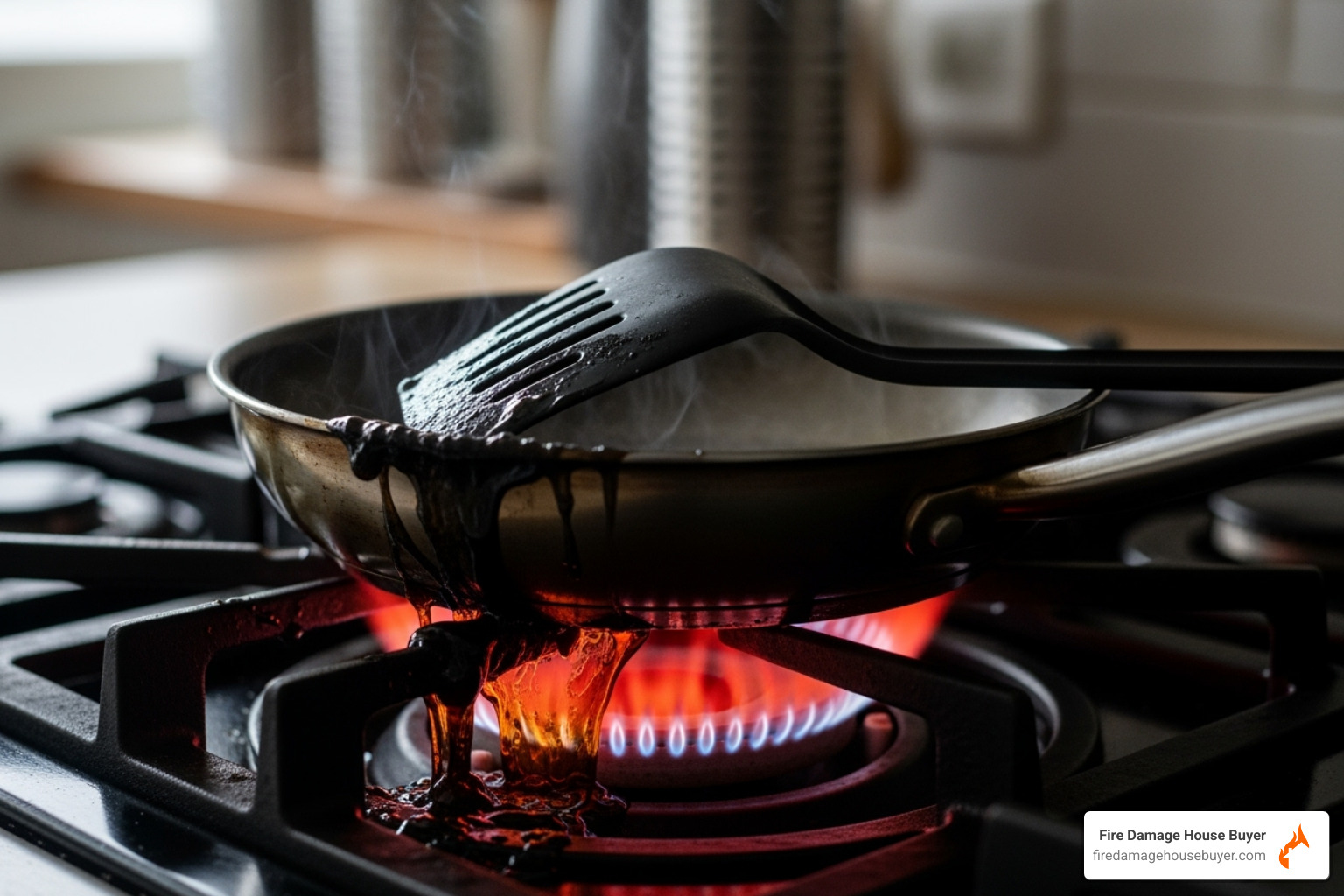
The Simple Way to Safely Locate the Source
After ventilating and shutting off power, the next step is to safely locate the source of the smell. If you see smoke, sparks, or feel unsafe at any point, stop immediately and call for professional help. Your safety is paramount.
Use your nose to find where the smell is strongest, which will help narrow your search. Go room by room, focusing on areas with electronics or near HVAC vents.
With the power off to the suspected circuit, gently feel wall outlets and light switches. Warmth is a major red flag for an electrical issue. Look for scorch marks, and inspect appliance cords for fraying, discoloration, or melting. Unplug anything suspicious.
Next, check your electrical panel for a tripped breaker or signs of heat. If the smell comes from your vents, turn off the HVAC system at the thermostat and breaker, then inspect the main unit for any melting plastic.
Here are some Safety-First Investigation Steps to keep in mind:
- Always Prioritize Power Off: Before inspecting a suspected electrical issue, turn off the power at the circuit breaker.
- Shine a Light: Use a flashlight to see clearly in dark corners or inside appliances.
- Hands Off Live Wires: Never touch exposed wiring.
- Listen to Your Instincts: If you can’t find the source or something feels wrong, stop and call a professional.
If you can’t find the source or you see signs of damage like burn marks or flickering lights, call a licensed electrician or HVAC technician. Do not attempt complex repairs yourself. Catching these issues early can prevent significant fire damage and costly restoration.
The Aftermath: Removing Odors and Assessing the Damage
After fixing the source of the burning plastic smell, you may be left with a sticky residue and a lingering odor. This is smoke damage that has seeped into surfaces and air ducts, and dealing with it can be a complex and costly restoration challenge.
Smoke from burning plastic is especially difficult. As certified fire damage restorer Diana Rodriguez-Zaba notes, “When plastic burns, it tends to churn out heavy smoke that carries a sticky residue.” This greasy film coats surfaces, trapping toxic chemicals and odors, making it stubborn to remove without specialized tools.
Cleanup costs after a small plastic-burning incident can be substantial. Even with minimal fire damage, smoke cleanup and odor removal can be extensive and expensive. Costs include professional cleaning, fabric and upholstery restoration, HVAC system cleaning, and repainting with odor-blocking primers. Our guide on the Cost to Repair Fire Damaged House shows how these figures can escalate from a few thousand to over $100,000. Smoke damage from burning plastic significantly adds to these costs. For more cleanup guidance, see our guide on Cleaning Up After a House Fire.
How to remove a lingering burning plastic smell from a home
Removing the lingering smell of burnt plastic requires physically removing toxic particles from surfaces and the air, which can be a significant amount of work.
Here are the steps involved:
- Ventilation and Odor Absorption: Continuously ventilate your home with fresh air. Use natural odor absorbers like bowls of white vinegar, baking soda on carpets and furniture, and activated charcoal bags or air purifiers.
- Deep Cleaning Surfaces: The sticky residue must be wiped from all hard surfaces using a cleaning solution (e.g., water and dish soap or vinegar). This is labor-intensive and may require protective gear. Soft surfaces like curtains and bedding must be laundered, while upholstery may need professional cleaning.
- HVAC System and Air Purification: If the smell has circulated, your HVAC ducts will need professional cleaning, and all air filters must be replaced. Running air purifiers with HEPA and activated charcoal filters can also help.
If these extensive efforts fail to remove the odor, it’s time to consider professional restoration. Fire damage restoration companies use specialized equipment like ozone generators to neutralize stubborn, embedded odors. Our House Fire Damage Restoration Guide offers more insights into this complex process.
Prevention and When to Call for Help
Prevention is the best way to avoid a burning plastic smell emergency. Regular maintenance and knowing when to call for help are your best defenses against a potential fire, protecting your home from hazards and costly repairs.
To keep your home safe, follow these preventative tips:
- Electrical System: Schedule regular electrical inspections, especially in older homes. Avoid overloading outlets with too many devices. If an outlet feels warm, unplug everything and call an electrician.
- HVAC System: Replace air filters regularly to prevent overheating. Schedule annual professional servicing to keep all components in good working order.
- Appliance Safety: Clean your dryer’s lint trap after every load and check the vent hose for buildup. Keep plastic items away from hot stoves and heating elements. Keep space heaters at least three feet from flammable items and unplug them when not in use. Regularly check all appliance cords for damage and replace if frayed or cracked.
Despite preventative measures, problems can still occur. Know when to call a licensed electrician or HVAC professional. Your safety should always come first. Call for help if:
- You cannot locate the source of the burning plastic smell.
- You spot any signs of electrical damage, such as burn marks, warm outlets, or flickering lights.
- The smell is persistent after addressing obvious sources.
- The smell seems to be coming from within walls or your main electrical panel.
- Your HVAC system is emitting the smell or making unusual noises.
- You suspect a gas leak (evacuate immediately and call emergency services).
Ignoring these warning signs can have severe Legal and Financial Considerations After Fire. While prevention is key, accidents happen. If you face overwhelming damage and restoration stress after dealing with a burning plastic smell, remember there’s a simpler path. Instead of managing complex repairs, consider selling your house ‘as is’ for a fast cash offer. This can be the easiest way to move forward without the restoration burden. Sell Fire Damaged House to Fire Damage House Buyer. Stay safe and informed.
Frequently Asked Questions about Burning Smells
It’s natural to have questions when your home throws you an alarming curveball like a burning smell. We’re here to help clear things up and empower you with the right information. For even more insights, you can always check our dedicated FAQ page.
Does an electrical fire smell like burning plastic?
Yes, an electrical issue is a prime suspect if your house smells like burning plastic. The odor comes from the PVC insulation on electrical wires melting when they overheat. This is a major red flag for a serious electrical fault that could cause a fire. If you smell this near outlets or switches, act fast: turn off the power at the circuit breaker and unplug devices.
Can carbon monoxide smell like burning plastic?
No, that’s a common and very important misconception. Carbon monoxide (CO) is notoriously sneaky because it’s an odorless and colorless gas. You won’t smell burning plastic, or anything at all, if carbon monoxide is present.
The burning plastic smell indicates an immediate fire risk, but the fire itself (or even incomplete combustion from things like a faulty furnace or water heater) can also produce carbon monoxide. This is why having both smoke detectors and CO detectors in your home is absolutely essential. Your smoke detector will alert you to a fire you might smell, while a CO detector is your silent guardian against this invisible, deadly threat that can harm your vital organs without any warning signs.
What should I do if the smell is strong but I can’t find the source?
This is a critical moment where your safety comes first. If the burning plastic smell is strong, persistent, or you’ve done a quick, safe check and still can’t pinpoint the source, please evacuate your home immediately. Get everyone, including pets, out of the house and to a safe distance. Once you’re safely outside, call 911 or your local fire department without delay.
A strong, unlocatable burning smell could mean there’s a fire smoldering inside a wall, in the attic, or within other hidden parts of your home. These types of fires are particularly dangerous because they can spread silently and go undetected for a long time. It’s always better to be overly cautious when it comes to potential fires. Never re-enter your home until fire officials have given the all-clear and declared it safe. Let the professionals handle the investigation and ensure your home is truly out of danger.
Conclusion: Your Safest and Simplest Path Forward
A burning plastic smell is a serious risk. After addressing the immediate danger, you may find that what started as an odor has become significant smoke and fire damage throughout your home.
The restoration process is often overwhelming: a long, expensive, and emotionally draining ordeal. Even a minor incident where your house smells like burning plastic can lead to thousands, or tens of thousands, of dollars in costs for professional odor removal, specialized cleaning, and replacing contaminated belongings. This doesn’t include the weeks or months of disruption and stress from dealing with contractors and insurance companies.
But you have another option.
Instead of enduring the complex and costly restoration process, you can choose a simpler path. Fire Damage House Buyer helps homeowners by offering a fast, fair cash offer for their fire-damaged property “as is.”
This means no repairs, no cleaning, no contractors, and no waiting. We handle the complexities, allowing you to sell your fire-damaged house and move forward without the burden of restoration.
We understand the challenges you face after fire damage. Our goal is to provide a hassle-free solution with no repairs, no commissions, and a fast closing. You can skip the stress and uncertainty of the restoration process entirely.
Don’t let the aftermath of a fire hazard drain your peace of mind and finances. Take control of the situation now. Sell Fire Damaged House to Fire Damage House Buyer and find a straightforward way to move on.

